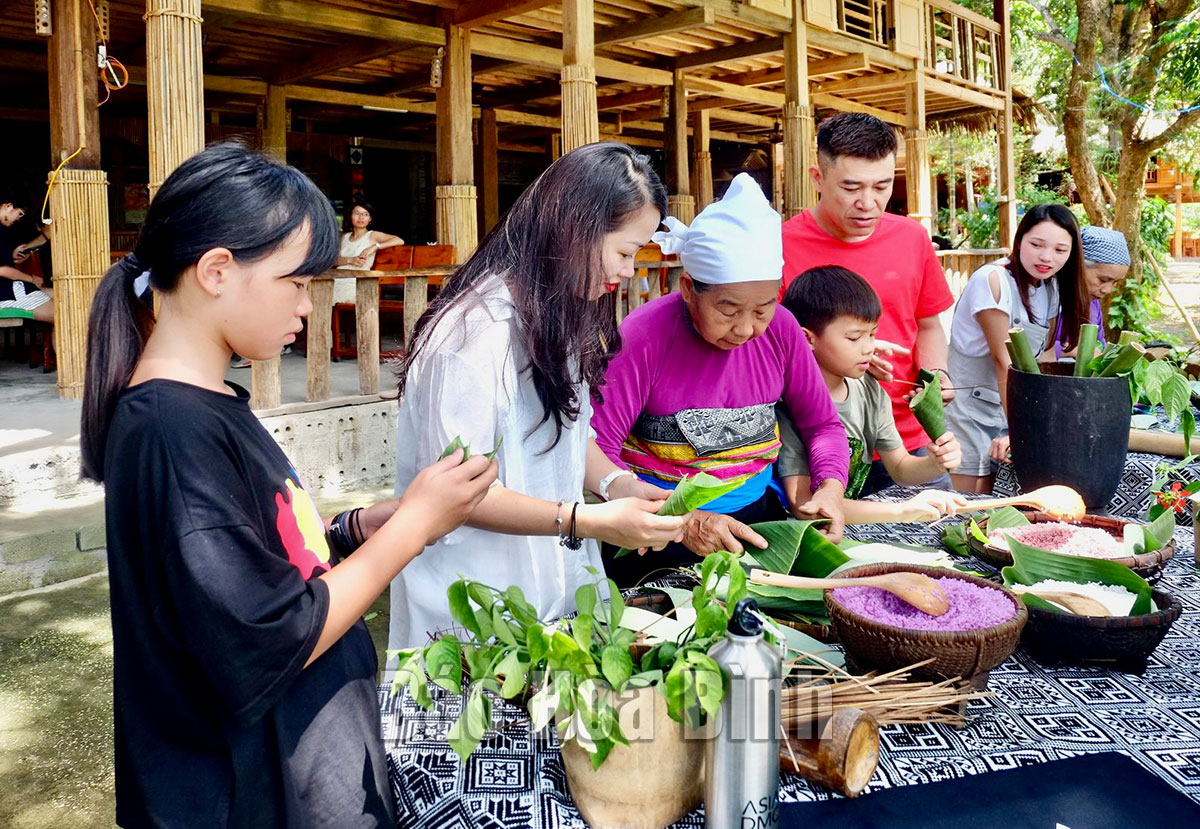



Visitors are experience the culinary process of Thai ethnic people at the community tourism site of Hich village, Mai Hich commune (Mai Chau).
This place is likened to a picture with the majestic nature among the mountains and forests of the Northwest, the residence of Thai villages is located among the green rice fields, creating a poetic mountainous region. Tourists visit famous community tourism sites such as Lac village (Chieng Chau commune); Van village, Pom Coong village (Mai Chau town); Na Phon village, Nhot village in Na Phon commune, Buoc village (Xam Khoe commune), Hich village (Mai Hich commune). Besides discovering the nature and visiting the villages, tourists are especially impressed with the cultural lifestyle, the customs and the habits that the people here are preserving and promoting. The outstanding feature is that the villagers know how to exploit the natural conditions, build the hamlets, the cultural villages, restore the traditional festivals and folk art, develop the craft villages, the traditional craft villages, build new tourism products and services, meeting the needs of visitors.
Also located in Mai Chau valley, the resorts and eco-tourism sites have sprung up quite a lot, helping to diversify the types, exploiting the potential and advantages of local tourism. The most famous is Mai Chau Ecolodge resort in Na Phon commune with a quiet space, hidden in the mountains and forests, the architecture is like an ancient Thai village. In the resort there are 21 independent bungalows with 43 rooms, providing a full range of services: swimming pool, spa, restaurant... Visitors can participate in the traditional music performances, walk to discover the nature, make the local dishes by themselves to understand more and feel Thai cultural identity.
At the end of autumn, the weather is cold, Mai Chau valley is with a rich beauty, the brilliant yellow sunlight, looming the houses on stilts keeping the traditional Thai architecture. This resort is crowded all year round, not only on holidays, Tet and at weekends. The most bustling villages are Lac, Pom Coong, Hich. Many international tourists have returned to visit, experience and stay long at the community tourism sites after Covid-19 epidemics has been brought under control. According to the statistics, Mai Chau district welcomed nearly 388,000 turns of visitors in the first 9 months of the year. The total revenue from tourism is estimated at over 420 billion VND. The destinations in the tourism sites have welcomed more than 7,100 turns of international visitors.
According to Ms. Ha Thi Lieu, the Deputy Head of the District Information and Culture Department: Mai Chau Valley also has beautiful cave landscapes, such as Mo Luong cave, Chieu cave, Pieng Kem cave and the archaeological relics in Hang and Khau Phuc caves. On Sunday, Mai Chau upland market are active, creating the attractive tourism products, attracting domestic and international tourists. Mai Chau tourism site is also a key tourist destination, attracting tourists of the province. Coming here, visitors can immerse themselves in the beautiful nature, enjoying the fresh air, participating in the cultural experience tours of Thai ethnic community, the green travel routes or experience vacation services from the affordable to high-end one.